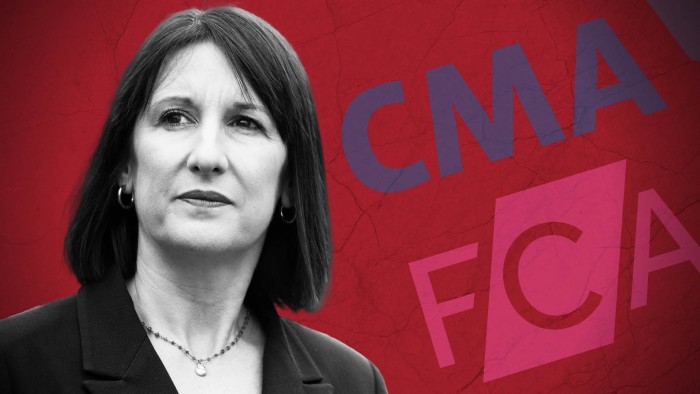For a Labour chancellor it was a bold move: Rachel Reeves went to Davos and told an audience of global plutocrats that she wanted to make their lives easier by creating a riskier regulatory environment for UK consumers.
Far away from the Swiss Alps, Reeves’ offensive against regulators was cheered on by right-wing Conservatives, but some Labour MPs despaired that their chancellor’s quest for growth was taking the party into dangerous territory.
“People are holding their heads in disbelief,” said one senior Labour MP.
Reeves, speaking at the World Economic Forum, was adamant: “You have got to get the balance right. I think the balance has moved too far in regulating for risk. You have got to be able to protect consumers but people should be able to take risks as well.”
Marcus Bokkerink, chair of the Competition and Markets Authority, on Tuesday became the highest-profile casualty of Reeves’ new approach, as ministers forced him out of his job over his allegedly lukewarm appetite for growth-focused reforms.
His sacking was intended to serve as a warning to other regulators, according to government officials. This month, Reeves demanded that 17 watchdogs produce action plans to boost growth and has warned them she will be watching.
John McDonnell, former Labour shadow chancellor, said Reeves could hand a propaganda victory to Nigel Farage, leader of the populist Reform UK party, if she aggressively pursued her agenda at the expense of consumers.
“I’m becoming increasingly worried that this will all provide our opponents, in particular Reform, the opportunity to portray the Labour party as defending corporate abuse and profiteers,” he said.
Reeves’ efforts to protect business from what is seen in government circles as a damaging “compensation culture” has taken many forms in recent months, with a common theme: less money for allegedly wronged consumers.
This week, Reeves sought to intervene in a Supreme Court case to shield banks and other car loan providers from multibillion-pound payouts in a landmark mis-selling case, arguing that it would “adversely affect the UK’s reputation as a place to do business”.
Last year, the Treasury successfully put pressure on regulators to slash a proposed compensation limit for victims of payment fraud from £415,000 to £85,000, amid fears the new regime could seriously damage some fintech companies.
Reeves has also pushed for a review of the Financial Ombudsman Service to prevent more mass consumer compensation events, such as the £50bn paid out by banks over the payment protection insurance scandal.
The Conservatives find themselves in a curious position, egging Reeves on to push further with an agenda that began in 2023 under Rishi Sunak, when regulators were given a “secondary objective” to promote economic growth and competitiveness.
Andrew Griffith, shadow business secretary, wants to see a broader clearout of regulators and has been a critic of the Financial Conduct Authority, the City watchdog. He thought sacking Bokkerink was “a curious place to start”.
Bim Afolami, former Tory City minister, said: “The chancellor is doing exactly the right thing on the regulators. My advice to her is to keep going.” Another former Tory Treasury minister said simply: “I think she is probably right.”
But Conservatives also believe Reeves, presiding over a stagnant economy, is using regulators as a scapegoat. Harriett Baldwin, a senior Tory, said the chancellor should “acknowledge some of her own mistakes rather than blaming everyone else”.
Given that Sir Keir Starmer’s government is in the process of introducing a wave of employment regulation, many business leaders agree with the Tory critique that deregulation should start closer to Number 10. Ministers may yet water down that package.
Regulators say that in return for focusing on growth, Reeves has given a clear signal she will stand by regulators when things go wrong — as they inevitably will. “We feel she has our backs now,” said one.
Nikhil Rathi, FCA chief executive, told the House of Lords on Wednesday that proposed rule changes — such as easing controls on mortgage lending — could lead to more defaults. “One or two things are going to go wrong here,” he said, arguing that parliament should give the watchdog a “metric of tolerable failure”.
Consumer groups have expressed alarm. “The combination of anti-regulation rhetoric — and now the firing of the CMA chair — signals to consumers that the government stands ready to peel back the protections that were built for them,” said James Daley, head of the Fairer Finance research group.
Rocio Concha, a director at consumer group Which?, said the government was “absolutely right” to focus on growth and the role of regulators. But she added: “Strong consumer protections are not an impediment to growth. They are vital for economic growth because they help to create level playing fields for dynamic competition, while ensuring consumers are protected from being ripped off.”
Professor John Thanassoulis of Warwick Business School, who is also an independent CMA panel member, said the government should “resist the temptation to beat up on the CMA”.
He added: “It will not drive marketwide productivity growth. It will instead reward some well-connected firms to the detriment of the countless, but silent, majority who want a market which is not expensive, which is fair, and whose firms put the consumer first.”
Dame Meg Hillier, Labour chair of the Commons treasury committee, said that while she supported Reeves’ aim of pushing regulators to promote growth, it was “critical that economic stability and protections for consumers are not unduly put at risk”.
For now, most Labour MPs are not mobilising against Reeves. “There’s a bit of muttering about not going back to 2008,” said one Labour grandee, referring to the “light touch” regulatory landscape before the financial crisis. “But it’s not in the mainstream of the party yet — it’s still seen as a bit niche.”
https://www.ft.com/content/98539783-f974-4869-8aa0-73e119e46158


